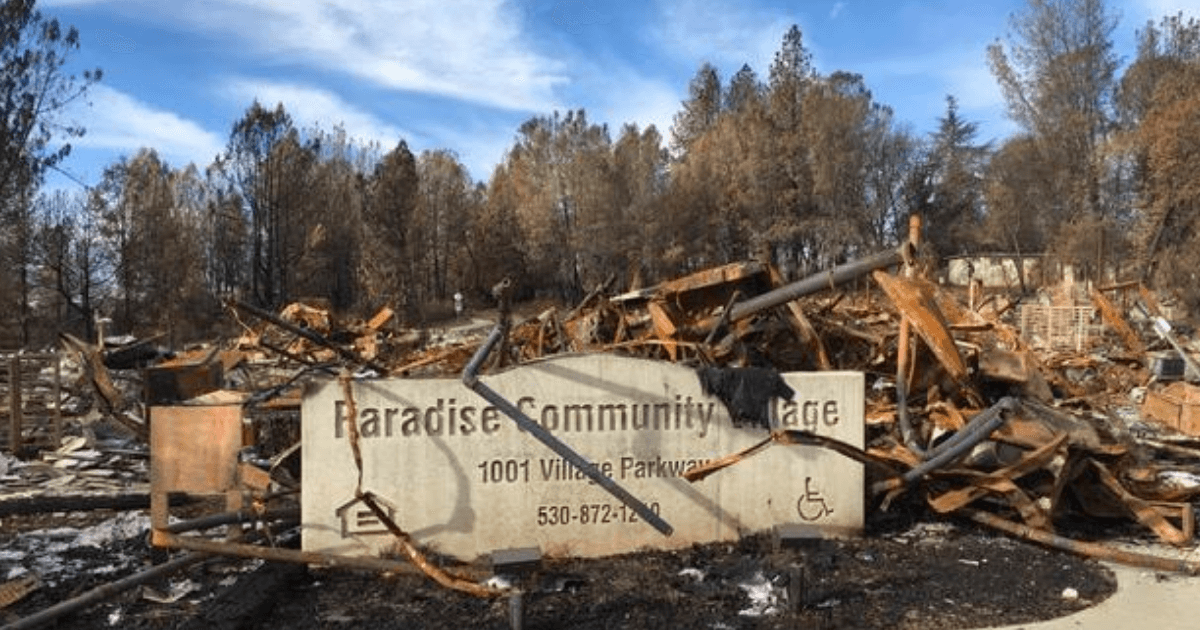
On July 27, reconstruction began on Paradise Community Village—a sweet, little 36-unit family project built with Low-Income Housing Tax Credits (LIHTC) that burned in the 2018 Camp Fire. This marked a much-deserved celebration of progress. Even as I write these words, it’s hard to believe we made it to this moment. There were many days where we didn’t think we would. Rebuilding Paradise Community Village is a story of government assistance and dysfunction, and the importance of true partnership.
Climate change is upon us, bringing with it a new catastrophic disaster every year. At this moment, dozens of fires burn across California threatening thousands. The Federal Emergency Management Agency (FEMA) and Internal Revenue Service (IRS) regulations have not kept up with the pace and scope of these disasters and, unfortunately, we experienced the effects of this firsthand. For better or worse, Paradise Community Village serves as a poster child for resiliency, disaster recovery, the very real impact of climate change, and the need for regulatory reform.
FEMA is both a godsend and a burden. No community can rebuild without its resources and knowledge; simply put, FEMA assistance made rebuilding Paradise Community Village feasible. But there were moments that FEMA, our savior, nearly broke our will. Their money is harder to navigate than almost any other funding source, which says a lot because we routinely deal with complex subsidy sources to build affordable housing. We have to streamline or reduce bureaucracy to make it easier for all victims of disasters to rebuild without experiencing the challenges and further trauma that comes with securing FEMA funding.
The IRS and LIHTC program, which made building Paradise Community Village possible in 2013, almost doomed its rebuilding and threatened to bankrupt its developer, Community Housing Improvement Program (CHIP), in the wake of the Camp Fire. IRS regulations require a LIHTC project to be rebuilt within 25 months of a disaster to avoid tax credit recapture. This regulation, written after Hurricane Katrina, is intended to incentivize rebuilding to serve low-income tenants and protect taxpayers’ investment. Unfortunately, it has been interpreted by the IRS to leave no room for individual circumstances. Therefore, it didn’t matter that we faced community-wide devastation that was so extensive that debris removal took a year or that potable water was not available in some parts of the town until this year. If Paradise Community Village is not rebuilt by Dec. 31, 2020, the IRS will recapture over $1 million of credits.
The IRS’s position shined a light on one of the weaknesses of the LIHTC program structure but also illuminated the importance of partnership. As is traditional in LIHTC partnerships, CHIP, as the general partner, is required to reimburse the limited partner for any recapture. This requirement meant the logical economic decision was to not rebuild and instead utilize insurance proceeds to repay the limited partner and our other lenders. Fortunately, our limited partner, Merritt Community Capital, is a nonprofit mission-based investor. They understand the importance of Paradise Community Village as a tool for recovery for a town and region reeling from the loss of 19,000 units of housing. They have chosen to stand by our side even as the IRS continues to deny our request for an extension. Our organizations may lose over $1 million for doing the right thing and rebuilding low-income housing.
At this moment, 21 months after the disaster and four months away from tax credit recapture, we choose to celebrate our hard-earned victories. Paradise Community Village is rebuilding AND we must make it easier for others in the future to relish in their moment of celebration. Our opportunity to keep fighting is strengthened by the alliances we form and the wisdom we gain together. Disasters will not solve themselves. Together, we must work smarter to streamline the recovery process and ensure IRS regulations really do incentivize rebuilding.
Seana O’Shaughnessy is president and CEO of the Community Housing Improvement Program.

